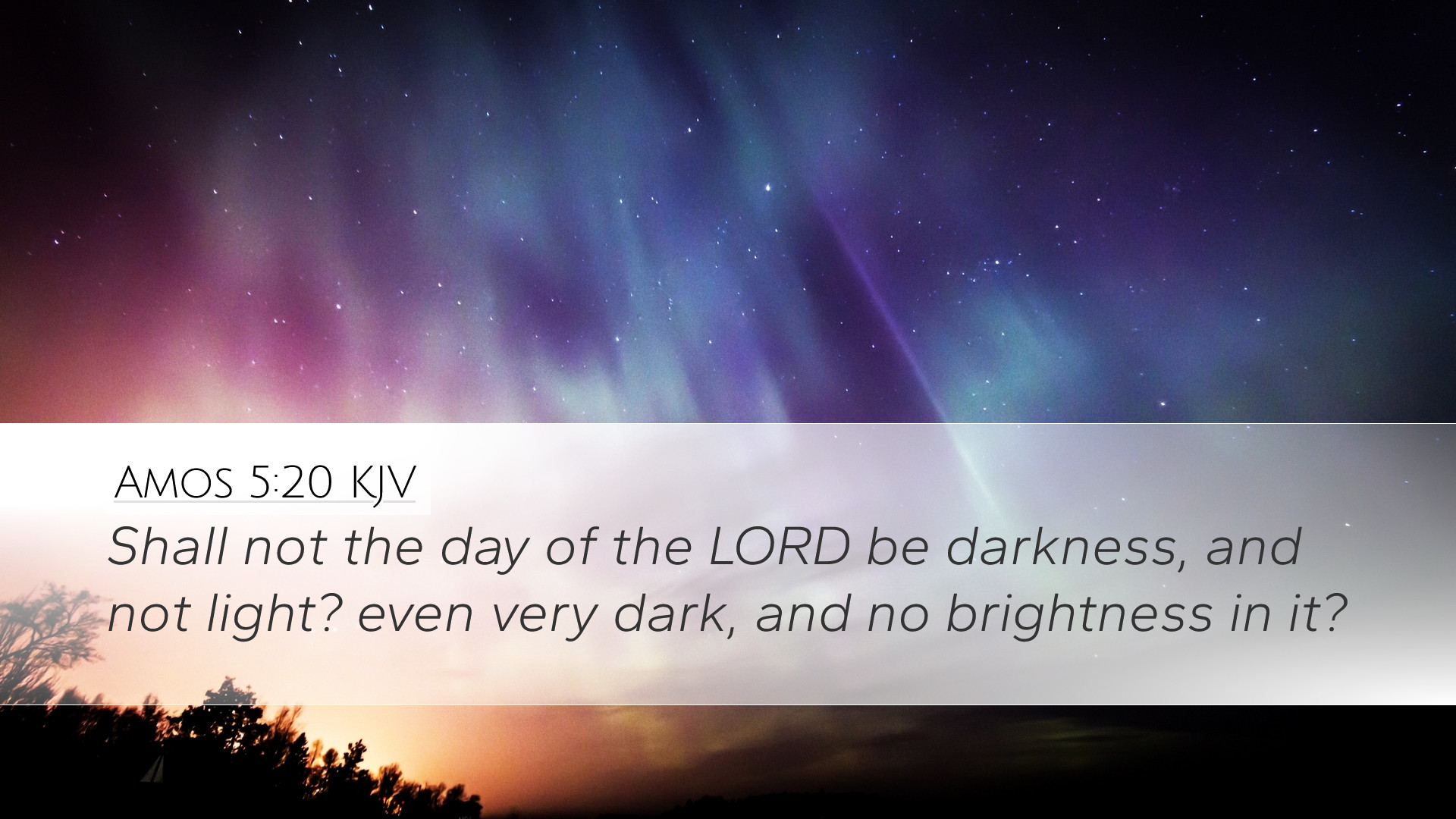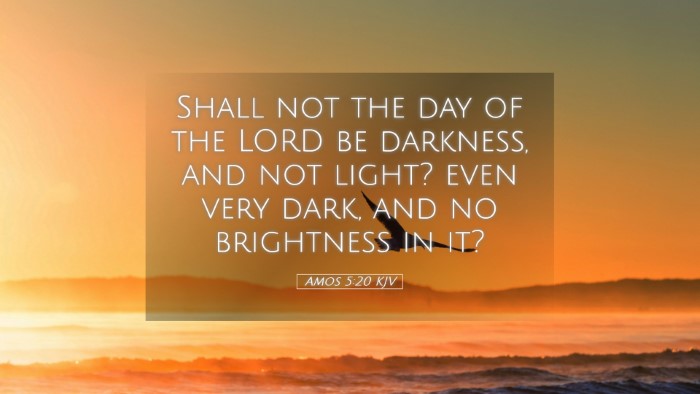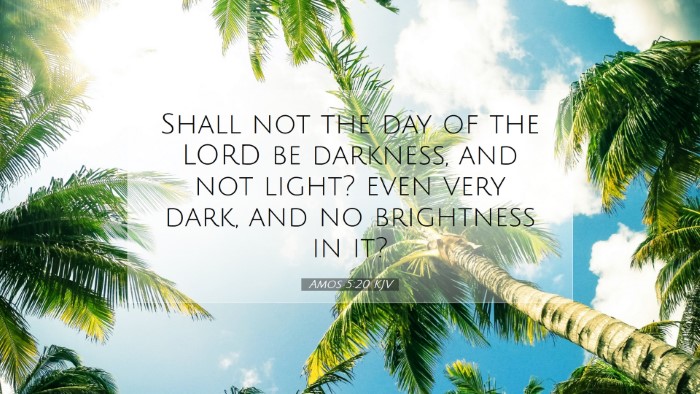Old Testament
Genesis Exodus Leviticus Numbers Deuteronomy Joshua Judges Ruth 1 Samuel 2 Samuel 1 Kings 2 Kings 1 Chronicles 2 Chronicles Ezra Nehemiah Esther Job Psalms Proverbs Ecclesiastes Song of Solomon Isaiah Jeremiah Lamentations Ezekiel Daniel Hosea Joel Amos Obadiah Jonah Micah Nahum Habakkuk Zephaniah Haggai Zechariah MalachiAmos 5:20
Amos 5:20 KJV
Shall not the day of the LORD be darkness, and not light? even very dark, and no brightness in it?
Amos 5:20 Bible Commentary
Commentary on Amos 5:20
Amos 5:20 declares, "Shall not the day of the LORD be darkness, and not light? even very dark, and no brightness in it?" This verse is a profound admonition from the prophet Amos, one that speaks to the nature of divine judgment and the ethical state of Israel at that time. Below is a synthesis of insights derived from various public domain commentaries to provide depth and understanding for pastors, students, theologians, and Bible scholars.
Context of the Passage
Amos, a shepherd from Tekoa, served as a prophet during a period of prosperity in Israel. However, this prosperity was accompanied by moral decay and social injustice. In this context, the prophet delivers a warning about the coming day of the Lord, a theme prominent throughout the prophetic books.
Interpretations of the Day of the Lord
The term "the day of the LORD" refers to a time of divine intervention in human affairs. Different scholars provide varying perspectives on its implications:
- Matthew Henry interprets the day as a time of reckoning where God will judge His people for their unfaithfulness. He emphasizes that for those living in sin, this day will be one of darkness, devoid of any light from God.
- Albert Barnes suggests that this day is likened to darkness, symbolizing confusion and despair prevalent among those unprepared for God's judgment. He warns against overconfidence in their status as God’s chosen people.
- Adam Clarke articulates that darkness here represents not just physical darkness, but also spiritual darkness—a lack of hope and understanding as a result of their sinful actions.
Symbolism of Darkness
The imagery of darkness in Amos 5:20 carries profound theological implications:
- Judgment and Consequence: Darkness symbolizes the judgment that comes from ignoring divine commands and engaging in injustices. The nation of Israel, despite its privileges, stood poised for repercussion due to its moral failures.
- Spiritual Blindness: It suggests a state of being spiritually blinded by sin; they cannot see the truth of their situation or the coming judgment, echoing Clarke's insight.
- Contrast with Light: The absence of light signifies the withdrawal of God's favor. This serves as a stark contrast to the belief that the day of the Lord would be one of triumph for Israel.
Exegesis of Key Terms
A closer examination of key phrases enriches our understanding:
- "Day of the LORD": This phrase encompasses more than a single day; it implies an era of God's direct action in history. Scholars note that it is often both near and distant, having applications in both the immediate judgment on Israel as well as eschatological implications.
- "Darkness": Used throughout Scripture, darkness often signifies evil, judgment, and separation from God. The repetition of the idea of “very dark” highlights the seriousness of the impending crisis.
- "No brightness in it": The intensity of the darkness emphasizes the complete desolation and absence of hope during this time—a condition reflecting the spiritual state of Israel.
Implications for Modern Readers
The message of Amos 5:20 resonates with believers today:
- Self-Examination: Pastors and theologians might encourage congregations to reflect on their own lives, questioning whether they, too, may be living in a state that requires correction.
- Call to Justice: The background of Amos emphasizes the importance of justice and righteousness as not merely religious observance but a vital expression of faith.
- Hope in Darkness: While this passage highlights dire consequences, it also invites readers to turn to God, often a theme in prophetic literature—repentance leading to restoration.
Conclusion
Amos 5:20 serves as a stark reminder of the characteristics of God's judgment and the consequences of moral decay. Through the insights provided by the commentaries of Matthew Henry, Albert Barnes, and Adam Clarke, we are encouraged not to take the warnings lightly but rather reflect upon our own spiritual condition and the societal injustices present today. The prophet Amos urges us to pursue true worship characterized by justice and mercy, aligning our lives with God’s expectations as we anticipate His presence in our lives, whether in judgment or grace.
Let us heed these lessons from Amos, striving to walk in the light of God’s understanding and righteousness.


